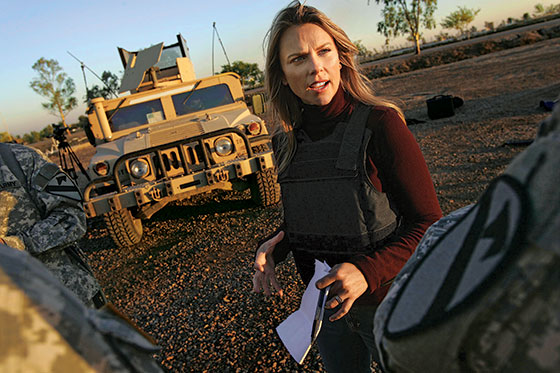Benghazi and the Bombshell
- By Joe Hagan
- New York Magazine
- Published May 4, 2014
 |
|
(Photo: Chris Hondros/Getty Images)
|
Eleven years ago, the 60 Minutes correspondent Lara Logan was sitting in the InterContinental hotel in Amman, Jordan, watching her career flash before her eyes.
She was 31 years old, a rookie at CBS News, assigned to cover the biggest story on earth: the invasion of Iraq. But nothing was going as planned. With only days until the American invasion, Logan had been forced to leave Baghdad and was desperate to get back before the war began, but she and her crew, because of the dangers of the imminent “shock and awe” bombing campaign, were forbidden from going by the network. That’s when she heard about a convoy of French reporters making the trek to Baghdad.
“She called me several times, begging to go with us,” recalls Laura Haim, a French TV journalist. But the French decided it was too dangerous having an American broadcaster onboard, even if she was South African. “I said, ‘No way.’ ” Fluent in three foreign languages, Logan begged in French.
Logan had labored tirelessly for this chance, spending several months in Kabul during the invasion of Afghanistan and heedlessly throwing herself into danger for the camera to deliver raw reportage to the CBS Evening News and 60 Minutes II, the spinoff version of the Sunday program. Her work had earned her notice at the highest levels of the network. CBS chairman and CEO Leslie Moonves, from his perch in Los Angeles, viewed her steely eyes, breathless delivery, and exotic accent as the raw material of a future star. So Logan had strategized with her agent to make the biggest possible splash in Baghdad—a replay of Christiane Amanpour’s star turn at CNN during the first Gulf War.
Days later, as American bombs rained down on Iraq, the French reporter was startled to see Lara Logan standing in the lobby of the Palestine Hotel in Baghdad. “Look, I made it!” she declared.
Two Iraqi fixers had smuggled her across the border, making her the only major American network-TV staff broadcaster in the country when the war began. “I was really impressed by her courage,” says Haim. “It was not bullshit. She really wanted to do things to make a name.”
Logan was launched. She became chief foreign correspondent in only three years and a top correspondent on 60 Minutes two years after that.
But last fall, after a deeply flawed 60 Minutes report on the attack in Benghazi, Libya, the trajectory of her career, along with that of CBS’s flagship news show, changed abruptly.
Logan and 60 Minutes had been searching for a new angle on the Benghazi story for the better part of a year, and finally one seemed to arrive. The break in the story came from a hulking, goateed former military contractor who called himself “Morgan Jones.”
READ THE REST OF THE STORY AT THIS LINK TO NEW YORK MAGAZINE.







